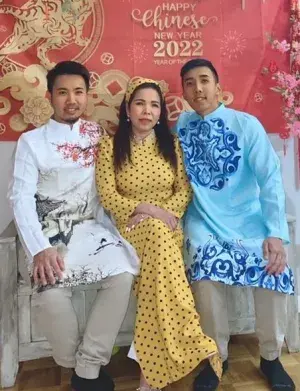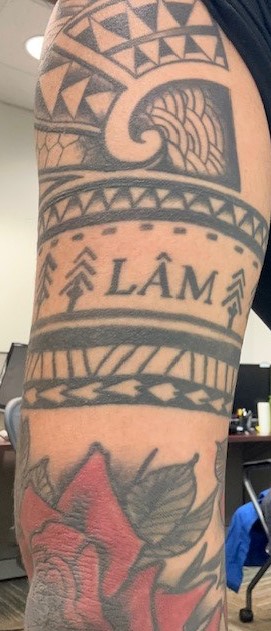
First generation Vietnamese-American Tim Lam brings his dedicated work ethic and respect for diversity to his supervisory TSA duties at Bill and Hillary Clinton National Airport (LIT) in Little Rock, Arkansas.
“When I got in, I was very proud to wear the uniform and to be working for the government,” said Lam of his 2015 TSA beginnings at Boston Logan International Airport. “I’ve always wanted to move up and put in a bunch of times for lead officer at Boston, but I always got shot down. I never let that get to me and never said that I wasn’t good enough.”
As it turns out, perseverance runs through his family tree.
Vietnamese Roots
Lam’s parents, who met in California as immigrants, have distinctly different experiences leaving 1970s war-torn Vietnam. His mother, then approximately 16 years old was aided by an older sister who was already in the U.S.
“She got the paperwork, and she was able to board a plane,” said Lam.

His father, on the other hand, risked his life as he fled his homeland in the time leading up to the Fall of Saigon.
“He escaped Vietnam on a boat, and he ended up making it to Thailand where he took refuge for a while,” said Lam.
With conditions not much better in the refugee camp than the cramped and under provisioned boat, his father’s fortunes turned when his sister made it to the U.S.
“My aunt ended up doing the paperwork and got him a sponsorship to get him over to America with a green card,” said Lam.
His parents met through mutual friends, married and moved to Boston where Lam was born. He rarely saw them because they worked so much — his mother as a nail technician and his dad as a laborer.
“I don’t want to take that for granted,” said Lam. “I don’t want to ever not appreciate where I came from because of all the hardships they went through. They came here with nothing to give me what I have, and I don’t want to ever not appreciate that.”
His heritage reveres a multi-generational household which may seem different compared to American standards.
“In America, when kids turn 18 they want to get out of the house,” said Lam. “In my culture, you can stay with your parents forever. Everyone takes care of one another.”
Career Challenges
While the adjustment from Boston to Little Rock took a minute, Lam found climbing the career ladder tricky.

“I transferred in (to LIT) as a transportation security officer (TSO) and quickly promoted to lead TSO within a year and then supervisor a year or so after that,” remembered Lam. “The difficulty with that is gaining the respect from the officers whom I worked alongside as TSOs. At times they treated me like I was still a TSO instead of a supervisor. It was hard for both sides to adjust and for me to take on the identity as a supervisor. With a lot of support from my peers and managers, I was able to assume the role that I feel like I was always meant to embody.”
Lam excels at the mission and is the recipient of former Executive Assistant Administrator Darby LaJoye’s Frontline award for the contributions he made to Security Operations.
Recognizing the power of diversity
“My Vietnamese isn’t as good as I wish it was because growing up here, you know, (I was asked by my parents to speak) English because we got made fun of in school,” said Lam who moved to Little Rock, Arkansas, with his mom after his parents separated. “That ties into screening because I have a lot of experiences where I have to tell officers all the time just because they don’t understand English yelling at them louder in English isn’t going to have them understand any better. We have to have an understanding that the passenger comes from a different background, and English is actually a very hard language to learn as a second language. Speak to them like how you want to be spoken to.”
Lam’s Vietnamese-American heritage has heightened his awareness for acceptance and tolerance of all people. He is a chairperson for a subcommittee on TSA’s Diversity, Inclusion, Equity and Accessibility Council (DEIA).
“At the time (of the supervisory promotion), I was the only supervisor of color and the only Vietnamese-American in all of the airport. I felt alone,” said Lam. “The challenge that came with that is that I felt like I was always out of place, like I didn’t belong. Sometimes I still feel like that. Change comes with time and so does acceptance — accepting others who may not be the same as you or have different beliefs.”
What I do matters
“I support TSA’s mission and culture by facilitating and encouraging understanding and respect amongst the officers and towards the passengers we interact with every day. Living in a southern state that doesn’t see much diversity in terms of things such as culture and race gives me the opportunity to share my knowledge and experiences with others who may not have had that information. As a change agent for DEIA, I utilize my position to teach officers and others how their words or actions can hurt others, and how they can be more inclusive by just changing some of the terms they use.
“TSA is a melting pot of so many different people from all parts of the world, and I want to continue to be able to bring different types of people into the workforce by not being intolerant to things or people we don’t know. What I do matters because I can already see a change in the work force when it comes to interactions with the passengers. Officers are using more inclusive terminology, and changing how they interact with passengers whose first language isn’t English. We want to treat everyone with the same level of courtesy, tact and respect.”
By Karen Robicheaux, TSA Strategic Communications and Public Affairs
